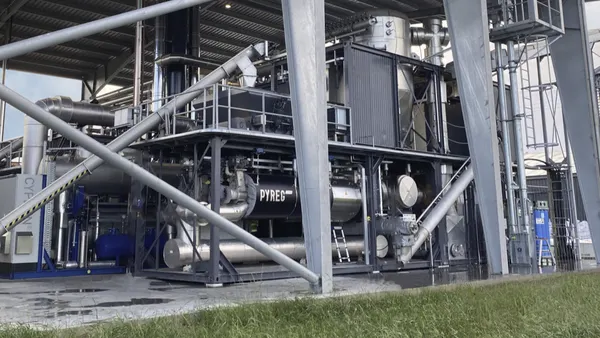Dive Brief:
- The Proceedings of the National Academy of Science journal recently published research showing that the Massachusetts Institute of Technology (MIT) has demonstrated a way to convert emissions from landfills, power stations, and steel mills into liquid fuels using manipulated microbes. Its viability has been shown at a pilot plant in China and will now be tested on a larger scale with researchers hoping to confirm they have a cleaner, relatively cheap, and easy to mass-produce alternative to fossil fuel.
- The process uses bacteria to convert gases into vinegar, next turning them into an engineered yeast, and ultimately producing an oil. This fuel from renewable sources would likely come not only from garbage, but manure and other farm waste, which MIT Professor Gregory Stephanopoulos called promising, claiming, "The volumes are staggering."
- MIT owns the patent for the technology, which is licensed to GTL Biofuel Inc. The first pilot, successfully done at a plant near Shanghai, will now be followed by a 20-fold larger "semi-commercial" demonstration plant to assess cost and carbon footprint.
Dive Insight:
Using waste gases to make low-carbon liquid fuels could be a far-reaching way to address pollution and impact global warming, if it could be made at a low cost and on a large scale. While this technology is in its infancy, the researchers hope they are on their way to developing a renewable, cheaper, and cleaner replacement for gasoline or diesel.
At least, what started as a hypothesized concept four or five years ago is moving forward.
"We are looking at a very fast timescale [of development]. We have pieced the system together into an integrated system, where you put gas in one end and get a liquid fuel out of the other end," said Stephanopoulos, as reported in The Guardian.
The next trial phase will be another test. "It is one thing to do it on a scale of 1-2 liters in the lab, but a different story to move up 1,000 liters and then 20,000 liters in the demonstration plant," said Stephanopoulos.
Others have begun to venture into liquid gas from renewable sources, including UK-based biomass-to-liquid fuel specialist Velocys in a project in Oklahoma City.









